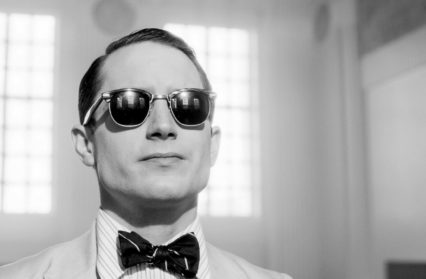Gary Raymond reviews Andy Goddard’s Dylan Thomas biopic, Set Fire to the Stars, and expresses disappointment at how the film fails to live up to the man that it celebrates.
A connoisseur of conspiracy theories might suggest the BBC chose the Dylan Thomas biopic, Set Fire to the Stars, to headline its BBC Two St David’s Day schedule in order to undermine what little positive attention the Welsh nation has managed to accrue in the wake of the poet’s centenary celebrations in 2015. One could imagine the scheduling being designed specifically to redress a bit of balance to the natural order of things, to remind the rest of the United Kingdom that Wales is nothing but a backwater of drunk caricatures, and that above all, Wales is dull. Wales has a history of dull poets, and now it has a dull movie about a dull poet to go with it. That’s how the conspiracy theorist writes the dialogue of the scheduling meeting.
Almost everything about Andy Goddard’s movie rings hollow. It is like a student homage to great movies set in the 1950s – from Rear Window to Carol. The monochrome flattens everything and could not be further from the Herman Leonard atmosphere that is surely being aspired to. Gruff Rhys’ soundtrack fails to connect with either the plasticity of feeling going on within the frame, or the lifeless storyline that it tries to prod along. Rhys’ is no jazz man, that much is obvious, and whereas some of the tinkles may in-and-of-themselves work as compositions, overlaid on this movie they prove fatally incapable of shaking the composer’s pop sensibility. You get the feeling Rhys thinks he’s laying down Ascenseur pour l’échafaud, but all that comes out is forced rather than inspired – and what does come out is plonked in and ripped out in the edit without any real panache. The flatness continues from end to end.
The script itself suffers from several major flaws. Firstly, it is unrealistically portentous when it comes to Thomas’ demise. Almost from the moment we are introduced to him we are aware he sees the tragedy of his early death on the horizon. Thomas, of course, did have a preoccupation with death, and predicted his own in various maudlin moments, but in the logistics of a screenplay it just makes him a bore. And he speaks in unrealistic prosody, around every new corner is the opportunity for a flowery observation or pseudo-intellectual witticism. It is all surface – not once is there ever really an attempt to help the viewer understand why Thomas was regarded as a genius in his day, and what would make him a national icon post-mortem. If ever a role was simultaneously under-developed and over-written then this is it, and although Celyn Jones gives it a decent stab, there is not much to stick a fork in. Thomas, without offering any insight or depth, gently strokes both poles of a suggested binary condition, but the film is – sorry for repeating myself – just too dull even to make striking theatre out of his alcoholic mania.
Across the table from him, his foil, John Malcolm Brinnin, the poet and academic who allured Thomas to the American tour with promises of great wealth, is played by Elijah Wood, and although Wood has an advantage over much of the other cast members in that he can deliver a convincing American accent, rarely has there been a more torporific leading man in Hollywood’s history. Brinnin’s memoir, on which this film is supposedly based, is an unreliable account of Thomas’ trip, but as preparatory material for the world of cinema it has a bestseller’s fire in its belly, a fire that is summarily extinguished here at every opportunity. Thomas the hellraiser is even introduced as a “man-baby”. To use local South-Walian parlance that Thomas himself would have been no doubt familiar with, in Set Fire to the Stars, Dylan Thomas comes across as little more than a bit of a wanker.
The film Set Fire to the Stars most brings to mind is Christopher Munch’s The Hours and Times from 1991. A real sadness because once Munch’s piece is brought to mind it is impossible to shake how a mature and sophisticated two-hander should be done, how beautifully and thoughtfully scripted it can be, how well acted it can be, how a familiar era can be given fresh evocative life with a sumptuous use of monochrome.
For all of the attention Dylan Thomas has had from Wales in recent years it seems our thinking on him is still mixed up, even nebulous. We know his story – my god, do we know the story – but how closer have we come to understanding the man now recognised as the foremost literary figure of Wales’ modern history. Set Fire the Stars offers us nothing a well-equipped bunch of sixth formers couldn’t tell us. And as a movie it’s just dull, and as the BBC’s St David’s Day token gesture, we could have gone without.



 Enjoyed this article? Support our writers directly by buying them a coffee and clicking this link.
Enjoyed this article? Support our writers directly by buying them a coffee and clicking this link.








